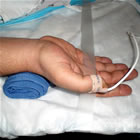| << To Blog Home >> | |
|
|
March 29, 2011 -- 4:30pm EDT Will a Heart Stent from the Wrist RIVAL One
from the Leg? But all this soon may be changing, if the results of an important study, being presented at this year's American College of Cardiology meeting, support the investigators' hypothesis:
The study is dubbed RIVAL (RadIal Vs. FemorAL Access for Coronary Intervention Study) and, as of last month, had enrolled over 7,000 patients. It's actually a sub-study of the CURRENT-OASIS 7 trial, which tested double-dose clopidogrel after PCI. But RIVAL will be looking at the incidence within 30 days of death, heart attack, stroke and non-CABG major bleeding in Acute Coronary Syndrome (ACS) patients who are experiencing unstable angina or heart attack (either NSTEMI or STEMI) and who are going to be treated with angioplasty and/or stents. Included in the definition of non-CABG major bleeding is access-site hemorrhage requiring intervention, retroperitoneal bleeding, where significant blood loss into the retroperitoneal space occurs, often undetected right away, large hematomas or any significant reduction in hemoglobin where there is no overt source of bleeding. And RIVAL will compare the 30-day results of those patients where femoral access was used vs. those who were treated via the transradial wrist approach.
Previous smaller studies have shown a significant reduction in bleeding complications with the transradial approach, and some have posited that mortality and bleeding complications are related. Speaking of complications, if you take a look at just two topics in our Patient Forum (Complications from Femoral Caths and Complications from Vascular Closure Devices) you'll find over 1,300 posts from patients who have suffered from bleeding complications with the femoral approach, not to mention trauma to the femoral nerve or complications from various vascular closure devices (which are not used in radial procedures). It's not that the femoral approach is terrible. Quite the contrary. Over 90% of patients do perfectly well with femoral caths -- and the radial approach is not possible in all patients. But when less than 7% of all procedures in the U.S. are done via the wrist, and the vast number of U.S. interventional cardiologists don't even know how to do radial procedures, something has to change. And on Monday morning, April 4, 2011, when the RIVAL results have been presented to the ACC/i2 Joint Session at ACC.11 in New Orleans, that change may well be accelerated. |
|


 At
At
